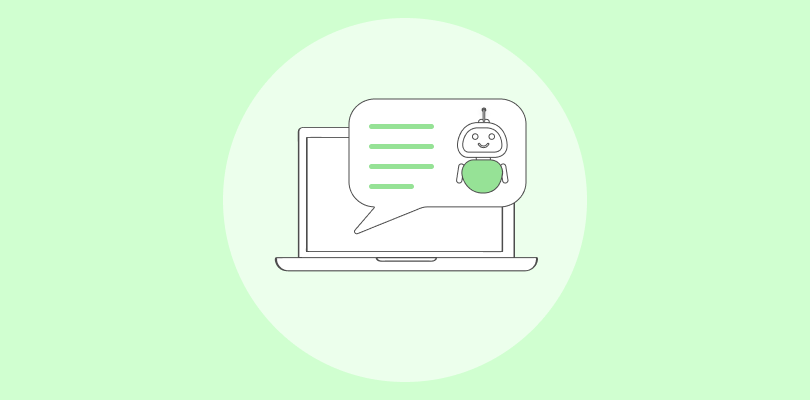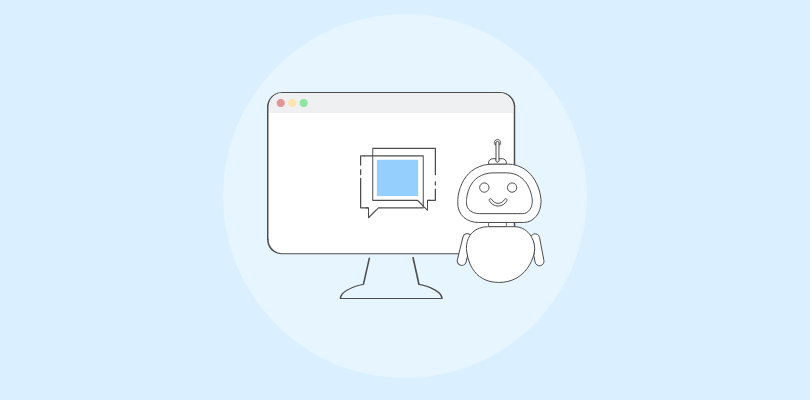As customer expectations rise, traditional communication methods like phone calls and emails often fall short. That’s why businesses need to leverage chatbot benefits to elevate their customer support and overall user experience.
Why?
During my 11 years in customer support, I’ve seen chatbots help automate routine tasks, enhance customer satisfaction with immediate responses, and reduce the workload on support teams.
According to Business Insider, 74% of internet users prefer using chatbots for simple questions.
Despite their growing popularity, many businesses face challenges implementing and integrating chatbots effectively. In this blog, we’ll explore the top 16 benefits of chatbots for businesses in 2025 and show how they can get started with them.
What Is a Chatbot?
For those new to the concept, a chatbot is a computer program designed to simulate conversations with humans. It is often powered by artificial intelligence (AI) and natural language processing (NLP). Chatbots are commonly used to interact with users through text or voice on websites, messaging apps, or customer service platforms.
There are two main types of chatbots: rule-based, which follow pre-set commands, and AI-driven, which learns and adapt based on user interactions. Businesses use it to enable customers to book tickets and troubleshoot technical issues.
| “Like any conversation, chatbots are a two-way street— and there are benefits for both brands and users.” — Neil Patel |
What Are the Benefits of Using Chatbots?
Chatbots are quickly becoming necessary for businesses looking to improve customer support and user experience. Let’s explore 16 benefits of chatbots for customers and internal teams.
1. Enables 24/7, Delightful Customer Support
There are numerous benefits of chatbots in customer service, as they offer continuous chat service availability, ensuring that your customers can receive assistance no matter the time zone or the hour of the day.
Unlike human agents who require breaks and sleep, chatbots can answer questions anytime and simultaneously handle multiple inquiries. This is especially valuable for businesses with global audiences.
Pro Tip: Integrate your chatbot with a knowledge base to instantly respond to frequently asked questions. This will ensure quick resolution and keep customers engaged, even at night.
2. Helps Provide Instant & Error-Free Response
Chatbots are designed to deliver immediate responses, a stark contrast to the delays often experienced with email or phone support, which significantly improves customer satisfaction by valuing their time.
Also, because they operate on pre-programmed information, chatbots drastically reduce the potential for human error. They ensure that customers receive reliable and consistent answers, ultimately building greater trust in your brand’s support.
Pro Tip: Set up automated/canned responses for common queries, such as order status or basic product information, to save time and reduce customer frustration.
Here’s a real-life example of how a company can enable instant, error-free responses by implementing chatbots with a live chat platform:

3. Provides Multilingual Support

Chatbots allow you to engage with a diverse audience and expand your reach across different regions. Offering your customers the ability to communicate in their native language enhances the customer experience, improves satisfaction, and fosters trust.
This reduces the burden on support agents and ensures customers from different backgrounds receive the same service quality. Businesses can break down language barriers by supporting multiple languages, allowing them to engage with more customers and improve their overall customer service operations.
Pro Tip: Carefully map your chatbot responses and knowledge base articles to each supported language. This ensures your chatbot provides consistent, accurate, and contextually relevant answers across different languages.
4. Improves Lead Generation
Chatbots play a significant role in lead generation by engaging customers early in decision-making. They can ask qualifying questions and gather necessary information about potential leads.
This automation reduces the need for human intervention, saving sales teams valuable time while maintaining a constant flow of qualified leads.
Pro Tip: Use your chatbot to ask pre-sales questions, such as customer needs and preferences, to qualify leads and route them to the right sales representative.
5. Results in Cost Savings
Chatbots help businesses cut operational costs by automating routine tasks, thus reducing the need for additional customer service agents.
They can handle thousands of conversations simultaneously, ensuring that no customer query is left unanswered, all while reducing overhead costs associated with human labor.
Pro Tip: Deploy your chatbot for low-complexity queries and save human agents for more advanced inquiries. This will help balance your team’s workload and improve efficiency.
6. Aids in Business Scalability
Unlike human agents, chatbots can scale easily. When your business grows and the number of customer interactions increases, chatbots can handle the additional load without requiring extra resources.
This scalability is invaluable, especially for businesses experiencing rapid growth or handling fluctuating customer support volumes.
Pro Tip: Plan your chatbot’s architecture to scale as your business expands. Ensure it can be easily updated with new content as your product range or services grow.
7. Brings Consistency in Customer Experience
AI chatbots in customer experience enable a uniform customer experience, following predefined scripts and offering the same responses every time.
This consistency is key to maintaining a strong brand image and ensuring that customers receive the same quality of service, regardless of when or how they interact with the chatbot.
Pro Tip: Update your chatbot’s script and knowledge base regularly to ensure it always provides customers with the most accurate and helpful responses.
8. Facilitates Personalized Interactions
With AI and machine learning, chatbots can be integrated with CRM systems to provide personalized customer interactions.
By analyzing customer data, chatbots can deliver tailored responses based on a customer’s previous interactions, purchases, and preferences.
This level of personalization improves the customer experience and builds a stronger relationship with the brand.
Pro Tip: Use data from your CRM to customize the chatbot’s greeting and responses, offering tailored product recommendations based on previous purchases or inquiries.
9. Enhances Customer Engagement
Chatbots can engage customers proactively by sending messages based on specific triggers, such as website visits or product browsing behavior.
This level of engagement encourages customers to interact with your business and can help move them down the sales funnel faster.
Pro Tip: Set up your chatbot to trigger helpful messages when customers show interest in specific products, offering them discounts or more information to encourage engagement.
10. Helps Automate Routine Tasks
Chatbots are ideal for automating repetitive and time-consuming tasks, such as answering FAQs, scheduling appointments, or collecting customer data.
This reduces the burden on human agents and allows them to focus on higher-value tasks, increasing overall productivity.
Pro Tip: Integrate your chatbot with calendar and booking systems to handle scheduling automatically, allowing customers to book meetings without human intervention.
11. Enables Better Data Collection & Analytics
Chatbots automatically gather valuable data during customer interactions, capturing behavior, preferences, and pain points.
This rich information fuels comprehensive analytics and reporting, allowing businesses to gain a deeper understanding, refine operations, effectively target marketing, and make data-driven decisions to improve services and products.
Pro Tip: Integrate your chatbot with your CRM and live chat platforms to correlate interaction data with customer profiles and operator performance metrics. This provides a holistic view, enabling targeted improvements in automated and human support strategies.
Here’s an example of how live chat software helps you track your operator performance:
12. Aids in Lead Qualification
Chatbots can help qualify leads by asking specific questions to determine a lead’s intent and readiness to buy.
This ensures that only high-quality leads are passed on to the sales team, improving the efficiency of the sales process and increasing the likelihood of conversion.
Pro Tip: Set up automated qualification questions to gauge interest and need, such as budget range or preferred product features, to direct the best leads to your sales team.
13. Improves Ticket Resolution Times
Chatbots help reduce the time it takes to resolve customer support tickets by gathering all necessary information before passing the ticket to a human agent.
This speeds up the resolution process and ensures that agents have all the information they need to handle the issue.
Pro Tip: Integrate your chatbot with your helpdesk system to automatically assign tickets to the right team member based on the customer’s issue, speeding up the resolution process.
14. Helps Improve Customer Retention
Chatbots provide quick, helpful, and personalized service to increase customer satisfaction, leading to improved retention rates.
Satisfied customers are more likely to return for future purchases and recommend the business to others.
Pro Tip: Use your chatbot to follow up with customers after their purchase to ensure satisfaction and provide them with relevant product recommendations for future purchases.
15. Integrates Seamlessly with Your Existing Systems
Chatbots integrate seamlessly with your existing tools, such as CRM software, ticketing systems, and e-commerce platforms.
This integration streamlines workflows, automates processes, and ensures a unified customer experience. Chatbots act as a bridge between different systems, simplifying operations for your business.
Pro Tip: Ensure your chatbot integrates with your CRM and help desk to provide agents real-time customer data. This allows them to offer more personalized support and reduces the need for customers to repeat their issues.
16. Cuts Down Cart Abandonment
Chatbots can nudge users who leave items in their shopping carts, reminding them to complete their purchases.
They can address hesitations by providing discount codes or answering product-related questions. This proactive engagement helps reduce cart abandonment and boosts sales.
Pro Tip: Set up your chatbot to trigger automatic reminders or offer personalized incentives (e.g., a discount code) when customers abandon their carts. This can help nudge them toward completing their purchases.
How to Create a Chatbot for Your Website
Now that you know how beneficial chatbots can be for your business, learning how to implement one on your website is essential.
Here are the simple steps, taking the example of ProProfs Live Chat:
Step 1
In your ProProfs Live Chat account, go to Bots in the top navigation banner.
Step 2
Hover your mouse over the Create New Bot button. You can select any of the following:
- Create From Scratch
- Create Using Templates
Step 3
To create it from scratch:
- Assign a name to your bot.
- Modify the Welcome Message.
- Add a new interaction panel to create a conversation flow.
- Preview your bot.
Step 4
Modify the Welcome Message interaction panel by clicking on the box to open the interaction panel, and click “Save.”
Step 5
Create the flow of your chatbot based on the current message and anticipated response by the user, if applicable
Step 6
Design the interaction panel to ask pertinent questions and obtain relevant responses from the visitor.
How to Choose the Best Chatbot for Your Business
Having just explained the steps to add a chatbot using a live chat platform, you must be wondering what key factors to consider while choosing one. Here are those:
1. Clearly Define Goals & Understand Your Audience
Before choosing a chatbot, pinpoint the tasks it should handle (support, leads, etc.) to align with your business objectives.
Simultaneously, you must understand your audience’s preferred communication channels (website, social media) and language needs to select a chatbot that effectively engages with your customers.
2. Evaluate the Ease of Use
A chatbot’s user interface and setup process should be simple and intuitive. Look for a solution that requires minimal technical knowledge and offers a no-code or low-code platform. This will save you time and money on technical support or hiring developers.
An easy-to-use chatbot should allow your team to manage the bot effectively, tweak its behavior, and adjust without complicated service training.
3. Consider the Chatbot’s Customization
The ability to customize your chatbot is crucial to ensure it reflects your brand identity and meets your business needs. Flexibility is key, whether customizing the chatbot’s design to match your website’s theme or creating specific workflows for different scenarios.
A good chatbot should allow you to adjust its responses, personalize interactions, and set triggers that reflect your brand’s tone and messaging style, making it feel like a natural extension of your business.
4. Check If It’s Easily Integratable
A chatbot should seamlessly integrate with your existing tools and systems, such as your CRM, helpdesk software, email platform, or eCommerce chatbots.
This ensures that the chatbot can collect and process relevant customer data, hand over complex queries to live agents when necessary, and create a smooth experience for your team.
Having these integrations in place also helps avoid siloed data and improves the overall efficiency of your business operations.
5. See If It’s AI-ready
Advanced AI and Natural Language Processing (NLP) allow the chatbot to understand better and respond to customer queries. Look for a chatbot that recognizes customer messages’ intent and responds appropriately.
Some bots also use machine learning to improve their accuracy over time. This is especially important if you expect your chatbot to handle complex queries or work in diverse industries where context is key.
If you want to create an AI chatbot, this insightful video can help:
6. Evaluate Its Scalability
As your business grows, so should your chatbot. You need a solution to handle increasing interactions, new use cases, and customer touchpoints.
Look for a chatbot that allows easy scalability, whether by adding more chatbots, handling a higher volume of requests, or providing more advanced features as your business needs evolve. This flexibility will ensure you don’t have to switch platforms as your requirements grow.
7. Consider Its Support & Analytics
Choose a chatbot with strong customer support to help you with any issues or questions. Reliable support can make a huge difference, whether it’s 24/7 live support, a knowledge base, or easy-to-access troubleshooting tools.
Also, detailed analytics and reporting are essential for measuring the chatbot’s performance. Insights into customer interactions, common questions, response times, and other key metrics will help you optimize the chatbot over time, ensuring it continues to meet your goals and improve user satisfaction.
FREE. All Features. FOREVER!
Try our Forever FREE account with all premium features!
Boost Efficiency & Engagement With the Best Chatbot for Your Business
Chatbots are no longer a futuristic novelty but are necessary for successful businesses. They help provide 24/7 support, personalize customer interactions, automate tasks, and gather valuable data.
Chatbots offer a significant competitive advantage in today’s fast-paced digital landscape by streamlining communication, reducing costs, and boosting engagement.
When considering a chatbot solution, ProProfs Live Chat stands out with its robust feature set and AI-powered capabilities. Its AI chatbot can be trained using your website data and knowledge base to provide accurate and instant answers, automate lead generation, and even book appointments.
FREE. All Features. FOREVER!
Try our Forever FREE account with all premium features!

 We'd love your feedback!
We'd love your feedback!
 Thanks for your feedback!
Thanks for your feedback!







